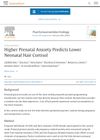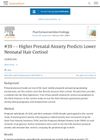 February 2024 in “Psychoneuroendocrinology”
February 2024 in “Psychoneuroendocrinology” Higher anxiety during pregnancy is linked to lower cortisol levels in newborns' hair.
 February 2024 in “Psychoneuroendocrinology”
February 2024 in “Psychoneuroendocrinology” Higher prenatal anxiety is linked to lower cortisol levels in newborns' hair.
 142 citations,
January 2019 in “Frontiers in Neuroendocrinology”
142 citations,
January 2019 in “Frontiers in Neuroendocrinology” Postpartum depression is linked to changes in brain chemicals, inflammation, stress, and certain genes, and can potentially be identified by markers like specific steroids, serotonin levels, and vitamin D levels.

Toxoplasma gondii infection may increase testosterone levels in males.
12 citations,
February 2017 in “International journal of developmental neuroscience” Female guinea pigs exposed to less allopregnanolone before birth showed more anxiety-like behavior.
 28 citations,
May 2015 in “Addiction Biology”
28 citations,
May 2015 in “Addiction Biology” Prenatal stress changes how male and female rats enjoy rewards differently, linked to sex hormones.
 25 citations,
June 2012 in “Endocrine”
25 citations,
June 2012 in “Endocrine” PCOS may start before birth, involves metabolic issues, and can be treated with drugs like metformin and lifestyle changes.
January 2020 in “Proyecto de investigación:” Longer anogenital distance may indicate a higher chance of having polycystic ovary syndrome, and measuring this distance along with hormone levels could improve diagnosis.
 99 citations,
October 2006 in “BMC clinical pharmacology”
99 citations,
October 2006 in “BMC clinical pharmacology” Finasteride may cause slight depression and anxiety.
 4 citations,
July 2022 in “Medicina-lithuania”
4 citations,
July 2022 in “Medicina-lithuania” Women with Polycystic Ovary Syndrome (PCOS) often have higher levels of anxiety and depression, especially if they live in rural areas, have less education, don't have children, are over 30, or are obese.
 27 citations,
July 2008 in “Neuroscience”
27 citations,
July 2008 in “Neuroscience” Finasteride given to baby rats causes anxiety-like behavior and worsens learning from punishment in adult rats.
 January 2024 in “International journal of yogic, human movement and sports sciences”
January 2024 in “International journal of yogic, human movement and sports sciences” Yoga Nidra improves well-being and reduces anxiety in women with PCOS.
 1 citations,
May 2023 in “Frontiers in Endocrinology”
1 citations,
May 2023 in “Frontiers in Endocrinology” Autism's genetics are linked with early age of puberty and less hair loss, but not with hormone levels or polycystic ovary syndrome.
 March 2021 in “Clin-Alert”
March 2021 in “Clin-Alert” The FDA warned about safety issues with remdesivir and tofacitinib, finasteride is linked to suicidality, potent topical corticosteroids increase osteoporosis risk, henna can cause hemolysis in G6PD deficiency, chemotherapeutic agents can cause adverse reactions, drug interactions are common in cancer patients, ketamine can reduce at-risk drinking, high dose of anticholinergics increases dementia risk in Parkinson's patients, and prenatal exposure to second-generation antipsychotics increases pregnancy complications.
 991 citations,
January 2011 in “Nature Reviews Endocrinology”
991 citations,
January 2011 in “Nature Reviews Endocrinology” The document concludes that PCOS is a complex disorder caused by both genetic and environmental factors, affecting women's health in various ways, and requires personalized treatment.
 10 citations,
July 2021 in “International Journal of Rheumatic Diseases”
10 citations,
July 2021 in “International Journal of Rheumatic Diseases” Lupus patients' body image issues significantly affect their mental health and need more support.
 21 citations,
July 2019 in “Cardiovascular Research”
21 citations,
July 2019 in “Cardiovascular Research” High levels of male hormones in pregnant mice cause heart enlargement and poor heart function in their female babies.
 883 citations,
August 2016 in “Nature Reviews Disease Primers”
883 citations,
August 2016 in “Nature Reviews Disease Primers” Polycystic Ovary Syndrome (PCOS) is a common condition in women that can cause metabolic, reproductive, and psychological issues, and requires lifestyle changes and medication for management.
 42 citations,
April 2013 in “Steroids”
42 citations,
April 2013 in “Steroids” Non-classic congenital adrenal hyperplasia is a common disorder causing symptoms like acne and infertility, and it's managed based on symptoms, not just test results. Treatment can improve fertility and reduce miscarriage risk.
 29 citations,
December 2012 in “Current Opinion in Endocrinology, Diabetes and Obesity”
29 citations,
December 2012 in “Current Opinion in Endocrinology, Diabetes and Obesity” With careful management, people with congenital adrenal hyperplasia can have successful pregnancies and become parents.
 10 citations,
May 2018 in “Neuropharmacology”
10 citations,
May 2018 in “Neuropharmacology” Drugs for hormone-related conditions might help treat mental disorders but could have serious side effects.
 May 2019 in “Paediatrics and child health”
May 2019 in “Paediatrics and child health” The document concludes that personalized treatment, including lifestyle changes and medication, is essential for managing PCOS in teenagers, while also addressing their psychological well-being.
 July 2017 in “Contemporary Endocrinology”
July 2017 in “Contemporary Endocrinology” The document concludes that patient outcomes for Congenital Adrenal Hyperplasia are often not ideal because of poor management and a need for better diagnosis and treatment methods.
 336 citations,
August 2015 in “European Journal of Epidemiology”
336 citations,
August 2015 in “European Journal of Epidemiology” The Rotterdam Study found risk factors for elderly diseases, links between lifestyle and genetics with health conditions, and aimed to explore new areas like DNA methylation and sensory input effects on brain function.
 May 2016 in “Cambridge University Press eBooks”
May 2016 in “Cambridge University Press eBooks” Eating disorders are serious, often undiagnosed conditions requiring early treatment, with anorexia being the most deadly and binge-eating the most treatable.
18 citations,
September 2021 in “Journal of Neuroendocrinology” Neurosteroids can influence behavior by modulating brain inhibition, with potential for treating psychiatric disorders.
 February 2023 in “Frontiers in Endocrinology”
February 2023 in “Frontiers in Endocrinology” Too much male hormone in mothers can negatively affect the sexual behavior of both male and female baby mice.
166 citations,
February 2005 in “Behavioural brain research” Vitamin D receptor knockout mice have significant motor impairments but no cognitive deficits.
 February 2025 in “IntechOpen eBooks”
February 2025 in “IntechOpen eBooks” Postpartum care should address hormonal changes, nutrition, and support to ensure mother and baby well-being.
 51 citations,
January 2003 in “Hormone Research in Paediatrics”
51 citations,
January 2003 in “Hormone Research in Paediatrics” Hormones and their receptors, especially androgens, play a key role in hair growth and disorders like baldness.


























